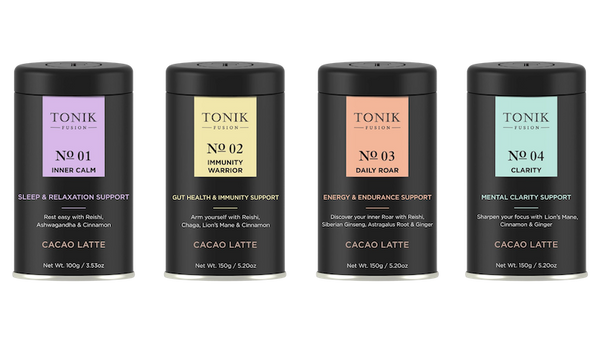What Does Reishi Do For Your Gut? | Reishi Digestive & Intestinal Benefits
Diving into the world of adaptogenic mushrooms, I've been continually amazed by their diverse health benefits. One standout experience was with Reishi, particularly its impact on my gut health. After including Reishi in my daily routine, I noticed a significant improvement in my digestion and overall gut comfort, which was a pleasant and unexpected benefit.
Reishi mushrooms offer several benefits for gut health, including aiding digestion, supporting the gut microbiome, and potentially alleviating inflammatory conditions within the digestive tract. Its active compounds, like polysaccharides, contribute to a healthier gut environment, making it a valuable addition to digestive health routines.
Reishi Mushroom Digestive Benefits

The digestive benefits of Reishi mushroom are profound. Its anti-inflammatory properties can soothe the gut lining, making it beneficial for those suffering from conditions like IBS. By promoting a healthy balance of gut flora, Reishi also contributes to a robust digestive ecosystem.
How Does Reishi Enhance Gut Health and Digestion?
Reishi enhances gut health and digestion by boosting immune responses, soothing inflammation, and strengthening the intestinal lining, which prevents harmful pathogens from entering. It's rich in beneficial compounds that promote a balanced gut microbiome, crucial for efficient nutrient breakdown and absorption.
By supporting digestive enzymes and microbial balance, incorporating Reishi into your diet can significantly improve the digestive process, ensuring optimal nutrient uptake.
What Are the Active Compounds in Reishi That Benefit the Gut?
Reishi contains several active compounds that contribute to gut health, including polysaccharides, triterpenes, and peptides. As shown by this study, polysaccharides, for instance, are known to support beneficial gut bacteria and enhance immune functions, which are vital for a healthy digestive system.
Triterpenes may help reduce inflammation in the gut, contributing to a healthier digestive environment. Peptides in Reishi can also play a role in supporting the gut's protective lining, further aiding digestion. Each of these compounds works synergistically to promote a balanced and efficient digestive process.
What Does Reishi Do For Gut Flora?

Research indicates that Reishi mushrooms can positively influence gut flora by fostering a diverse and healthy microbial ecosystem.
One study showed that reishi, and other functional mushrooms, make great prebiotic alternatives to traditional methods, by stimulating the gut microbiota.
Can Reishi Help with Digestive Disorders?

Reishi may provide relief for those with Irritable Bowel Syndrome (IBS) by helping manage its symptoms. The anti-inflammatory properties of Reishi can soothe the gut, potentially reducing the discomfort and bloating associated with IBS.
Additionally, its role in enhancing gut microbiota offers a supportive, natural approach to managing IBS symptoms.
The Immune-Boosting Power of Reishi: A Gut-Centric Perspective
Reishi's impact on the immune system extends to the gut, where a significant portion of the body's immune cells reside.
By modulating immune responses, Reishi supports gut health, potentially enhancing the gut's defense against pathogens and contributing to overall immune resilience.
Integrating Reishi into Your Diet for Optimal Gut Health
Starting with adaptogenic blends like those offered at Tonik Fusion can be a convenient and enjoyable way to introduce Reishi into your daily routine.
Our Immunity Warrior Cacao Latte, for instance, combines Reishi with other gut-supporting adaptogens like Lion's Mane and Chaga, offering a delicious way to support your digestive health. You can shop our whole range of Hot Chocolate Blends here.
FAQs on Reishi and Gut Health
Is Reishi a Prebiotic?
Reishi mushrooms contain compounds that may act as prebiotics, feeding beneficial gut bacteria and promoting a healthy microbiome.
How Quickly Can You Expect to See Improvements in Gut Health with Reishi?
Improvements in gut health can be noticed within a few weeks of consistent Reishi supplementation.
Can Reishi Be Part of a Gut-Health Diet Plan?
Yes, Reishi can complement a diet focused on gut health, working alongside other nutritious foods to support digestive wellness.
What Time of Day is Best to Take Reishi for Optimal Gut Health?
There's no specific best time to take Reishi; it depends on individual routines and preferences. Some prefer morning for overall support, while others take it in the evening for its calming effects.
Is it Safe to Incorporate Reishi Into a Daily Gut-Health Regimen?
Generally yes, for most people. However, it's always wise to consult with a healthcare provider, especially for those with existing conditions or taking medications.
Can Reishi Help You Sleep?
Yes, Reishi can help you sleep. Research shows Reishi helps reduce stress and anxiety, supports the onset of sleep and promotes deeper sleep cycles.
What Are Some Unknown Health Benefits of Reishi?
Wrap Up
Reishi mushrooms can be a valuable addition to a gut health regimen, offering support for digestion, gut flora balance, and overall digestive comfort.
For those looking to explore the benefits of Reishi, consider trying our adaptogenic mushroom Cacao Latte blends that provide a measured dose with a delicious chocolatey flavor suited for gut health support. You can check out our shop here.

Disclaimer: The information provided in this article should not be used as a substitute for professional medical advice, diagnosis, or treatment. The statements contained herein have not been evaluated by the Food and Drug Administration (FDA). Before adding Reishi to your health and wellness routine, talk to a health care professional about the potential benefits, side effects, and uses of this mushroom.
